1 SUSTAINABLE INVESTING
The purpose of this section is to introduce sustainable investing and, importantly, explain our approach to sustainable investing.
In 1987 sustainable development was defined by the United Nations as “development that meets the needs of the present without compromising the ability of future generations to meet their own needs.” This definition is widely recognisable because it is still taught in classrooms today, and is the theoretical foundation upon which sustainable investing builds. Our definition of sustainable investing is: a holistic approach to investing which widens the focus of investors by integrating sustainability considerations alongside the traditional focus of investors, risk-adjusted return. It comes in many shapes and sizes, but can be distilled into three primary pillars: environmental, social, governance (ESG), impact and ethics. For the avoidance of doubt, our definition of sustainable investing is our own and should not be considered as fact..
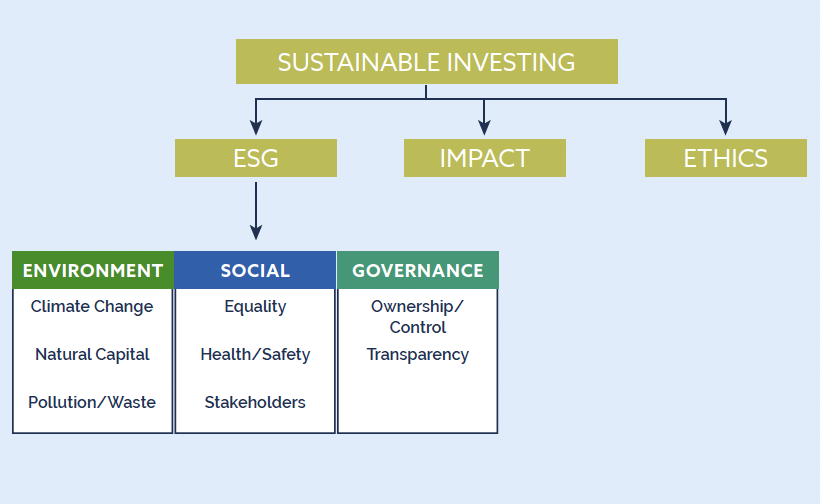
ESG
ESG is the integration of material non-financial data into the risk management process; the reason being, integrating more material data can improve the process and so can improve risk-adjusted returns. Examples of non-financial data include: greenhouse gas emissions, employee diversity, financial reporting quality. The outcome of this integration might be to prioritise or reduce exposure to certain geographies or sectors or companies. ESG leaders (those prioritised) and laggards (those reduced) can be identified in several ways. First, by using non-financial data, perhaps a third party ESG score, to identify geographies, sectors or companies that appreciate the necessity of the transition to a more sustainability-minded planet and are adapting their strategies accordingly. We call this basket of leaders adjusters (for example, Microsoft). Second, we can use traditional analysis techniques to identify sectors or companies that are either innovating at the cutting edge of this transition or are enabling those that are doing the innovating. There are two baskets here: the innovators (for example, Tesla) and the enablers (for example, SSE).
Impact
Impact is an explicit statement of sustainability targets separate to risk-adjusted return. Examples of these targets, which could be environmental or social in nature, include: reducing greenhouse gas emissions in-line with the Paris Agreement, or improving gender and racial diversity at the board or company level. Consequently, investors structure their portfolios to achieve this dual mandate.
Ethics
Ethics, or ethical investing, is the integration of an investor’s moral or religious beliefs into the portfolio construction process. It is the oldest of the three pillars of sustainable investing, and can trace its roots back to Shariah, the religious law of Islam, and to religious groups that prohibited members from participating in the slave trade. A more modern interpretation might be to exclude tobacco or firearms from an investable universe. For the avoidance of doubt, we do not explicitly screen out any controversial activities from our investable universe.
The purpose of our sustainable investment policy is to separate our investable universe into opportunities that do represent a sustainable allocation of capital and those that do not. This approach means that, across our sustainable investment proposition, we have exposure to all three of the pillars that constitute sustainable investing.
There are three sections to our policy: first, all investments must be classified by Morningstar as a sustainable investment; second, there must be no exposure to investments with any exposure to companies in violation of the UN Global Compact (UNGC); finally, the portfolio of investments must achieve a minimum aggregated MSCI ESG Rating of AA, which corresponds to a classification of Leader (see Appendix for more details).
There are substantial procedures in place to ensure daily compliance with the policy and protocols to follow if a breach to the policy is detected. These procedures and protocols have been put in place to mitigate the industry-wide challenge of greenwashing. The focus on non-financial data-driven risk management is powerful in its simplicity and, importantly, will continue to evolve to match best practice in the sustainable investing ecosystem.
To reflect the fact that we allocate capital across the three sustainable investing pillars, we decided to label our proposition as sustainable. The label accurately reflects the purpose of our investment policy which, as we explained, is designed to separate our investable universe into opportunities that do represent a sustainable allocation of capital and those that do not. There are six risk progressive models (3-8) in the Titan Sustainable MPS.
2 Q3 REVIEW
The purpose of this section is to review performance over the prior quarter, as well as any changes to our asset allocation or fund selections.
Performance
The models performed in line with expectations in Q3. Our preference for the front end of the yield curve was rewarded, as government bond yields continued their upwards march. Our equity basket suffered a little due to the natural bias of the models towards sustainability solutions. In particular, the EdenTree Green Infrastructure Fund and the Triodos Pioneer Impact Fund detracted from performance. Both funds remain on our watchlist as we move into Q4 but after the recent
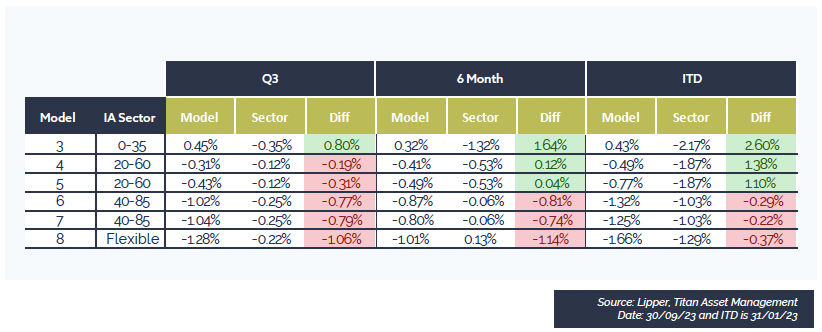
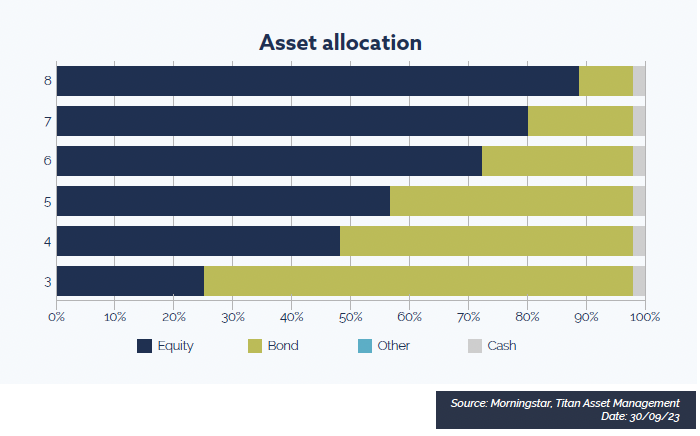
Model Changes
In July 2023 we made several changes to the Titan Sustainable MPS. We removed the Amundi MSCI Emerging Markets SRI PAB Index Fund and the Impax Environmental Leaders Fund. We added the BlackRock ICS Sterling LEAF and the Impax Asian Environmental Markets Fund. In August 2023 we made several changes to the Titan Sustainable MPS. We removed the Amundi MSCI World SRI PAB Index Fund. We added the BlueBay Global High Yield ESG Bond Fund GBPH and the CCLA Better World Global Equity Fund.
In September 2023 we made several changes to the Titan Sustainable MPS. We removed the Allianz Green Bond Fund GBPH, the Baillie Gifford Responsible Global Equity Income Fund , the CT UK Social Bond Fund and the Stewart Investors Global Emerging Markets Sustainability Fund. We added the Aikya Global Emerging Markets Fund, the Dimensional Global Sustainability Short Fixed Income Fund GBPH, the Janus Henderson USA Sustainable Equity Fund and the Storebrand Global ESG Plus Fund.
3 COMMENTARY
The purpose of this section is to build a narrative around our approach to sustainable investing. Included in this section are monthly commentaries from Q3 2023.
July 2023
In last months’ commentary we analysed the engagement vs divestment debate, concluding that despite some drawbacks that there remain good reasons to try to improve our stewardship of our clients’ investments though things like collaborative engagement. As we allocate capital mostly using externally managed funds (whether active or passive), opportunities to engage directly with companies and governments are limited. Consequently, collaborate engagement, where a group of investors pool resources to initiate dialogue with a company or government on a specific set of issues, is one of the best ways in which we can lend our brand and assets under management to initiatives tackling important issues. To that end, in July we became a signatory to CCLA’s global investor statement on workplace mental health. CCLA have done excellent work to shine a light on the importance of workplace mental health, the improvement of which is of significant benefit to both employees and their employers. Each year, in order to determine potential engagement targets, CCLA publish an assessment of companies in the UK and around the world to benchmark each company’s approach towards workplace mental health. Having become a signatory, we now look forward to collaborating with other signatories to this initiative in the future.
August 2023
According to Calastone, an industry services provider, net flows into sustainability-labelled funds have been negative for several months now. Some equity funds with a bias towards the quality growth style factor have been particularly hard hit. That said, it is a touch hyperbolic to jump to the conclusion that the structural shift towards sustainable investments is ending. It is possible that recent withdrawals are a function of the style factor biases of certain strategies, not the sustainability label itself. Indeed, results from the recently published Financial Conduct Authority (FCA) Financial Lives survey would suggest that growth in demand for sustainable investments is both strong and broad-based; 62% of adults with pensions or investments are interested in sustainable investments, up from 57% in the prior survey. More, the planned introduction of the Sustainability Disclosure Requirements (SDR) by the FCA, though delayed a bit, will help to better carve out different categories of sustainable investments, allowing for a more useful analysis of fund flows in the future.
September 2023
Earlier this year we wrote that a global clean energy arms race has begun in earnest. It is certainly a race worth winning. Unfortunately the UK, after making good progress to decarbonise parts of its economy in recent decades, no longer looks like it wants to compete on the world stage. In September the prime minister, Rishi Sunak, announced changes to several of the UK’s climate policies, including a delay in the ban on the sale of new petrol or diesel cars and a weakening of the plan to phase out gas boilers. Sunak was right to point out that the transition to a more sustainability-minded planet is not without costs or trade-offs, even if he did over-egg the scale and severity of some of these issues. In any case, the announcement was more about politics than responsible policymaking and sits in contrast to the words and actions of the UK’s neighbours across the Channel and the Atlantic; especially because Sunak’s announcement came during Climate Week NYC and the UN Climate Action Summit (also in New York), where government, industry and the general public gathered to discuss all things climate. The UK might well find its calling card in a post-Brexit world but for now, that card is not decarbonisation.
4 HIGH LEVEL STATISTICS
The purpose of this section is primarily to measure how well we are managing exposure to material ESG risks and opportunities (see Appendix for more details). Looking at the charts in this section, we can see that we are managing exposure to material ESG risks and opportunities well, scoring better than the market comparison (see Appendix for more details) in each instance.
Morningstar Classification
For all of the funds in their database, Morningstar uses things like regulatory filings to distinguish between funds that represent a sustainable allocation of capital and those that do not. Funds that are classified as sustainable are further broken down into two categories: general ESG investment, for funds that integrate ESG data into the portfolio construction and management process, and sustainability themed investments, for funds that additionally target a sustainability theme like climate action or human development. We can see that all funds held across the proposition are sustainable investments, and most funds are general ESG investments. This makes a good deal of sense, as these funds are far more common than sustainability themed investments.
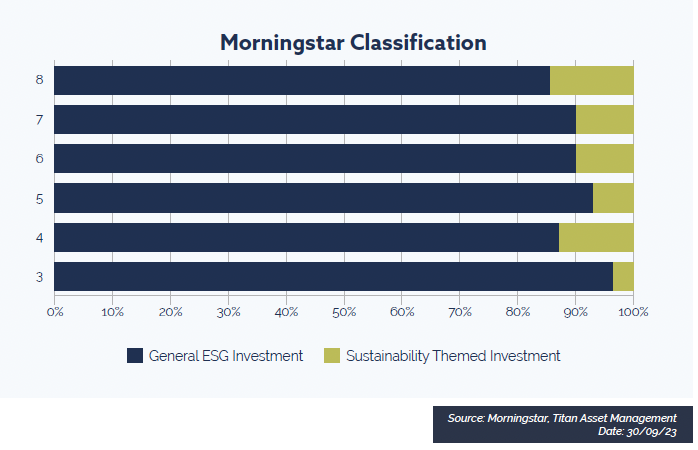
ESG Score
The score is a simple measure of how well key medium- to long-term ESG risks and opportunities are being managed and is measured on a scale of 0 to 10 (worst to best). In each instance, we (green line) achieve a higher score than the market comparison (blue line), indicating that our investments are, on aggregate, managing ESG risks and opportunities better than the market comparison. For the avoidance of doubt, the score should not be used to proxy the impact that a company or country is having on the real world.
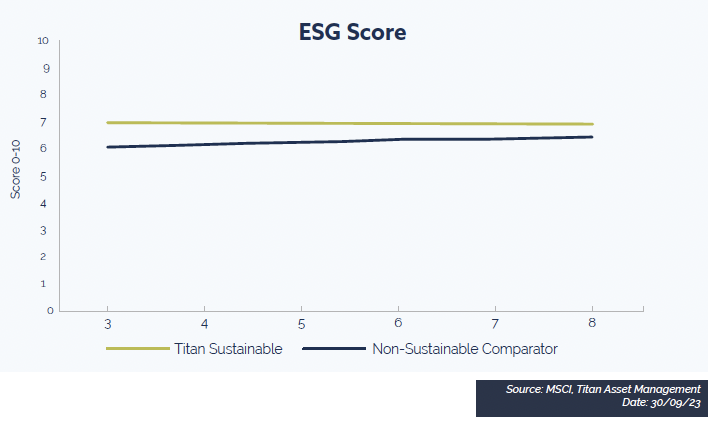
ESG Rating
The rating corresponds to the score (above) and is measured on a scale of CCC to AAA (worst to best). All models achieve an AA rating.

ESG Rating: Distribution
The majority of the underlying holdings across the proposition achieve an A rating or better..
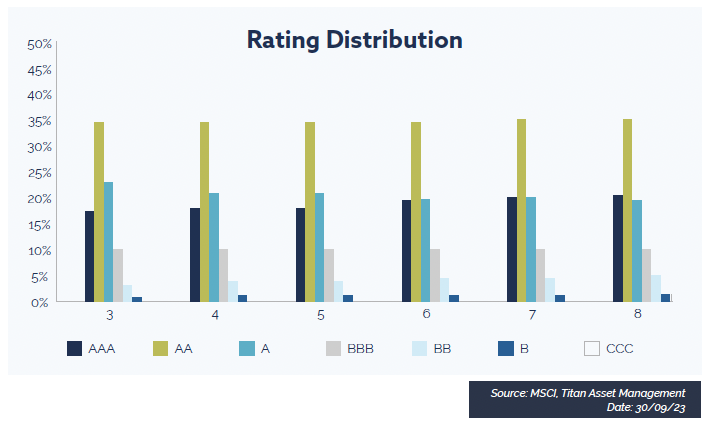
5 RISK STATISTICS
The purpose of this section is to measure and explore the material ESG risk of the proposition, excluding sovereign exposure. Looking at the charts in this section, we can see that the proposition is far less exposed to material ESG risk than the market comparison.
Carbon Risk
Companies which emit lots of carbon dioxide (CO2) are more exposed to carbon-related market and regulatory risks that arise due to climate change. We approximate carbon risk by measuring the carbon intensity of each fund in the proposition, which is the direct plus indirect CO2 emissions of the underlying holdings, divided by sales. Comparing the green line with the blue line, we can see that the carbon risk of the proposition is significantly less than that of the market comparison (the lower the intensity, the better). For Titan Sustainable 6, carbon risk is about 50% lower than the market comparison. According to the US Environmental Protection Agency (EPA), per USD1 million invested this reduction is equivalent to the emissions from about 15 petrol-powered passenger vehicles driven for one year. For the avoidance of doubt, a company with low emissions is not necessarily less exposed to ESG risks and opportunities than its peers.
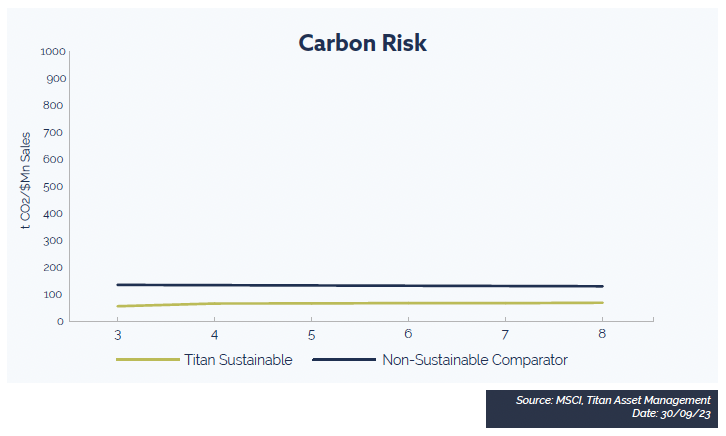

UN Global Compact Risk
There is a spectrum of good and bad actors in every sector and in every country. Measuring exposure to companies in violation of the Ten Principles of the UN Global Compact (see Appendix for more details) is a useful way to separate good actors from bad in a sector- and country-agnostic way (the lower the exposure, the better). The Ten Principles are based on a variety of international declarations and are focused on four areas: human rights, labour, the environment and anti-corruption. The proposition has no exposure to companies in violation of the Ten Principles, unlike the market comparison, which on average has about 1% exposure. For the avoidance of doubt, we rely on MSCI to determine whether a company is in breach of any of the Ten Principles.
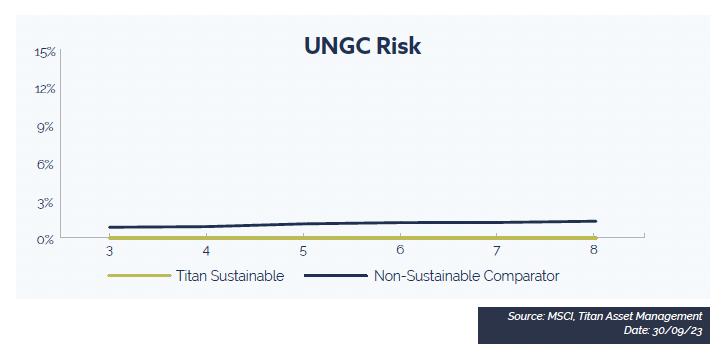
Controversial Business Activity Risk
The aggregated figure represents revenue exposure to a range of controversial business activities: adult entertainment, alcohol, firearms, fossil fuels, gambling, genetic engineering, nuclear, tobacco, weapons. If we compare the green line, our proposition, to the blue line, the market comparison, we see that the proposition is far less exposed to a range of controversial business activities than the market comparison (the lower the figure, the better).
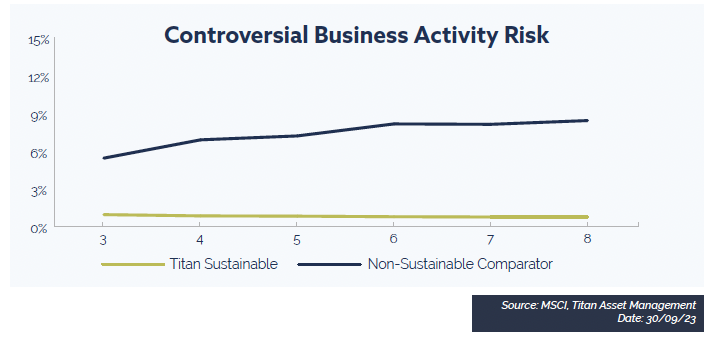
6 REAL WORLD OUTCOMES
The purpose of this section is to explore how the investments held across our proposition, excluding sovereign exposure, are affecting things in the real world. As we explained earlier in the report, these outcomes can be measured across a range of sustainability solutions, whether environmental or social in nature. Although our proposition does not follow a dual mandate (risk / return plus impact), we believe it is important to measure and communicate this data.
UN Sustainable Development Goal Alignment
The UN Sustainable Development Goals (SDGs) were adopted by the United Nations’ in 2015 as a universal call to action to end poverty, protect the planet, and ensure that by 2030 all people enjoy peace and prosperity. The SDGs are integrated; they recognize that action in one area will affect outcomes in others, and that development must balance economic, environmental and social sustainability. There are 17 SDGs, which can be mapped to 169 targets and a more granular set of 247 indicators.
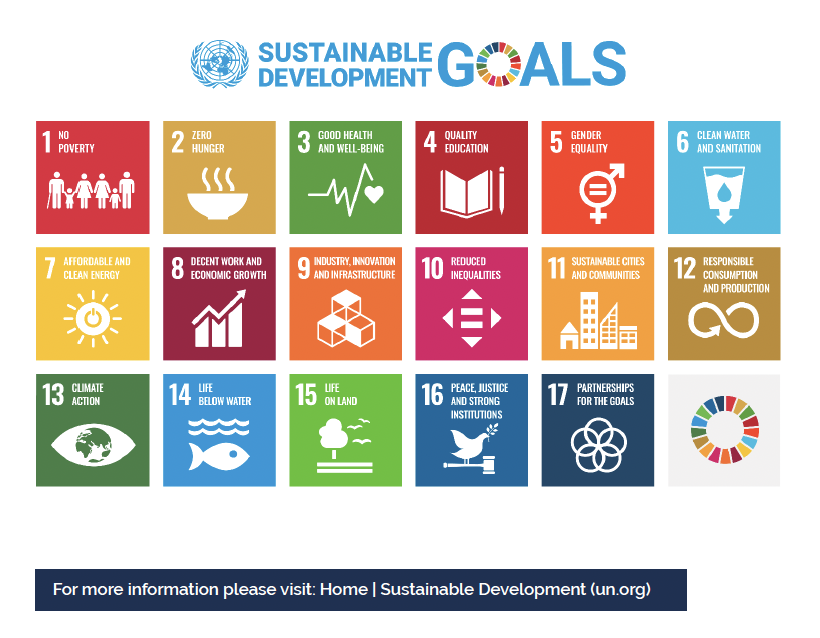
The SDGs provide the common language for investors like us to evaluate these real-world outcomes. Util’s tool relies on natural language processing to disaggregate a company into the constituent products that it sells. These products are than mapped to one or more sustainability concepts drawn from more than 120 million peer-reviewed academic journals. Once the products have been linked to these concepts, and then to the SDGs, the data can be re-aggregated to the company, then the fund, and finally to the level of our proposition. With the data crunching complete, we are then able see, using a radial chart like the one below, how Titan Sustainable 8 is affecting each of the SDGs.
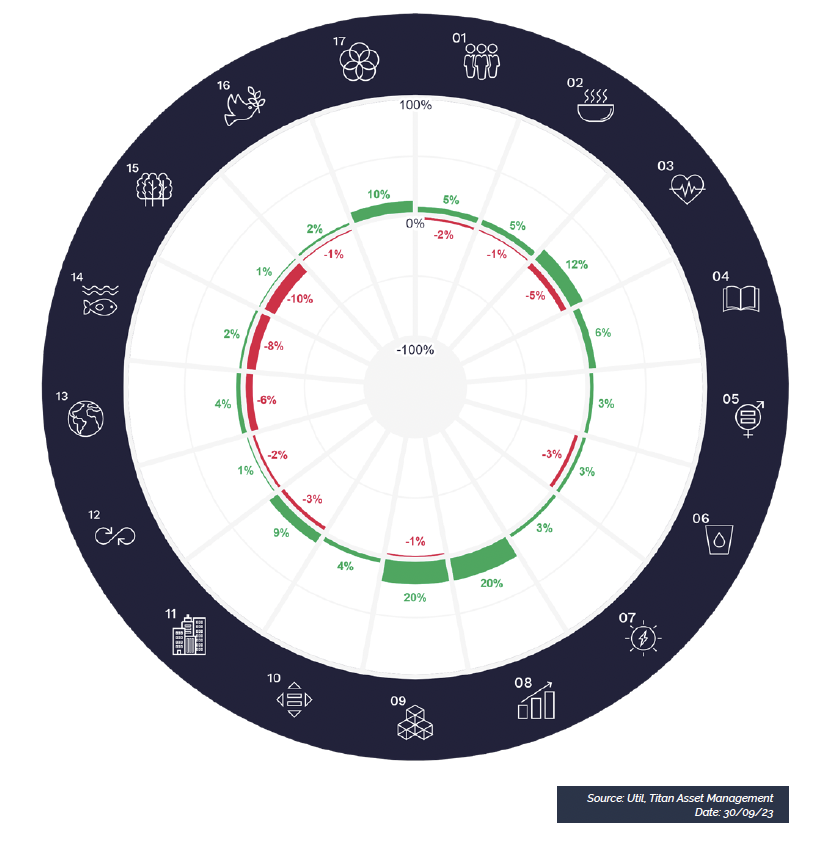
7 APPENDIX
The investment policy for the proposition is as follows:

Notes
- If there is a breach detected, there is a 125-day monitoring period where the investment responsible for the breach cannot be increased
- Cash is not subject to the policy
- The policy is subject to change
** There is no guarantee that the affected investment will be removed if still in breach at the end of the monitoring period.
The market comparisons used are as follows:
The market comparisons used throughout this report reflect the asset class allocation of each fund based on the underlying investment exposure of the asset portfolio to fixed income (investment grade and sub-investment grade securities) and equity (developed and emerging market) securities at the date of data. This information is for illustrative purposes only to provide an indicative comparison between a fund and a non-ESG market equivalent.
The full names for all MSCI ESG metrics used are as follows:
- ESG Score = MSCI ESG Quality Score
- ESG Rating = MSCI ESG Rating
- ESG Rating: Distribution = MSCI ESG Rating Distribution
- Carbon Risk = MSCI ESG Carbon Risk
- Controversial Business Activity Risk = MSCI ESG Business Involvement Screening Research Involvement
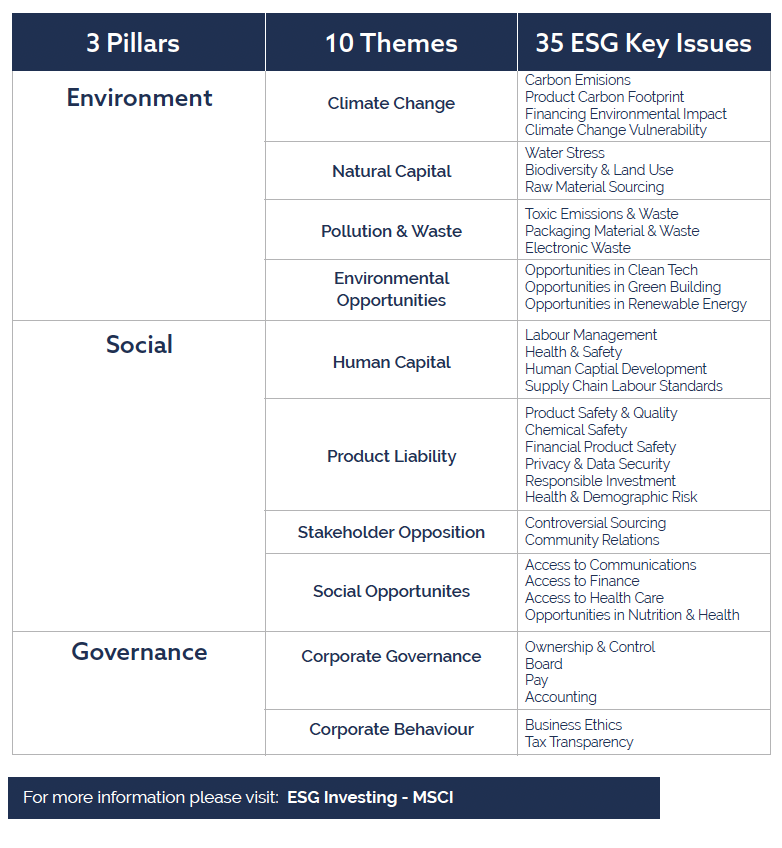
The Ten Principles of the UN Global Compact are:
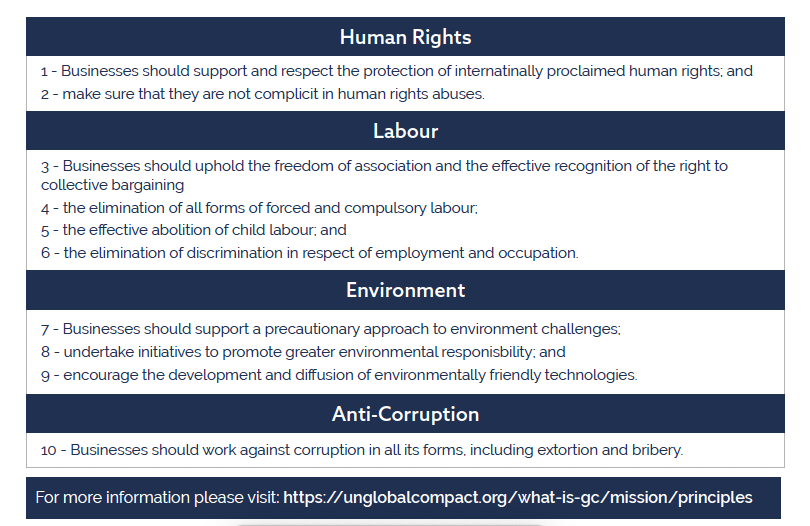
UN Principles for Responsible Investment (PRI)
Investor Initiative
Titan Asset Management became a signatory to the UN Principles for Responsible Investment (PRI) in 2022. The PRI is the world’s leading proponent of responsible investment. It works to understand the investment implications of ESG factors and to support its international network of investor signatories in incorporating these factors into their investment and ownership decisions. The PRI acts in the long-term interests of its signatories, of the financial markets and economies in which they operate, and ultimately of the environment and society.
To find out more about the PRI and the principles, please visit www.unpri.org
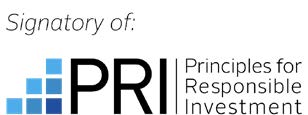
CCLA Global Investor Statement on Workplace Mental Health
Investor Initiative
Titan Asset Management joined this investor coalition in 2023. CCLA, the UK’s largest charity asset manager, have done excellent work to shine a light on the importance of workplace mental health, the improvement of which is of benefit to both employees and their employers. We believe that collaborative engagement, where a group of investors pool resources to initiate dialogue with a company or government on a specific set of issues, is one of the best ways in which we can lend our brand and assets under management to initiatives like this one tackling important issues.
To find out more about CCLA, please visit www.ccla.co.uk
19 Global Returns Project (GRP)
Charity Partner
Capital allocation will play a meaningful role in the transition to a more sustainability-minded planet. Measuring the impact of our capital allocation, as we do by using Util’s dataset, is an important first step for us in this transition. But, as the radial chart in the Impact Statistics section indicates, we can go further. Titan Asset Management became a partner of the GRP in 2022. GRP is a UK registered charity (no. 1186683) which curates the ‘Global Returns Portfolio’: a selection of diverse and effective not-for-profits tackling the twin biodiversity and climate crises. We have integrated a donation to GRP into our fee structure for some bits of our proposition. The purpose of doing so is to resolve the disconnect between allocated capital and real-world impact
To find out more about the PRI and the principles, please visit www.globalreturnsproject.earth
ESG Accord Initiative
Sponsorship
The sustainable investment ecosystem has evolved rapidly in a short space of time, both in terms of innovation and regulation, and the volume and pace at which this has happened mean new developments can be difficult to keep track of. The purpose of ESG Accord Initiative is to deliver best practice compliance, education and advice solutions to support financial advisers, their clients and other market participants. Titan Wealth (the parent company of Titan Asset Management) is delighted to be a founding sponsor of the Initiative, and we look forward to contributing to this resource in order to improve client outcomes for all.
To find out more about the Initiative, click www.esgaccord.co.uk

London School of Economics Green Finance Society (LSE GFS)
Sponsorship
Titan Wealth (the parent company of Titan Asset Management) became a sponsor of the London School of Economics (LSE) Green Finance Society (GFS) in 2020. The GFS is the sole sustainable finance-focused society at LSE. Their mission is to encourage greater consideration of ESG risks in financial decision-making and to equip LSE students with the skills and background knowledge required in this field. Over the past few years, we have enjoyed working with the GFS on a series of events, as well as participating in their flagship annual conference. We continue to be impressed by the students’ enthusiasm for and understanding of topics within sustainable finance.
To find out more about the GFS, please visit www.lsesugreenfinance.com

8 DISCLAIMER
Titan Asset Management is authorised and regulated by the FCA. The company is registered in England and Wales with Company Number 7805960. This report together with any other attachments are confidential and may only be read, copied and used by the intended recipient. You should not disseminate, distribute or copy this presentation. Titan Asset Management has approved this as a marketing communication and it is for private circulation only, and in the UK it is directed to persons who are professional clients or eligible counterparties for the purposes of the FCA rules and it must not be distributed to retail clients. It does not constitute an offer to sell or invitation to buy or invest in any funds mentioned herein and it does not constitute a personal recommendation or advice on investment, taxation or anything else. The information and any opinions are based on sources believed to be reliable, but accuracy cannot be guaranteed. Registered address: Titan Asset Management, 101 Wigmore Street, London, W1U 1QU.
Although Titan Asset Management’s information providers, including without limitation, MSCI ESG Research LLC and its affiliates (the “ESG Parties”), obtain information (the “Information”) from sources they consider reliable, none of the ESG Parties warrants or guarantees the originality, accuracy and/or completeness, of any data herein and expressly disclaim all express or implied warrantees, including those of merchantability and fitness for a particular purpose. The Information may only be used for your internal use, may not be reproduced or disseminated in any form any may not be used as a basis for, or a component of, any financial instruments or products or indices. Further, none of the Information can in and of itself be used to determine which securities to buy or sell or when to buy or sell them. None of the ESG Parties shall have any liability for any errors or omissions in connection with any data herein, or any liability for any direct, indirect, special, punitive, consequential or any other damages (including lost profits) even if notified of the possibility of such damages.
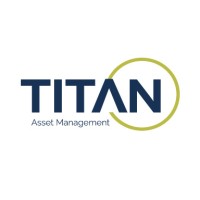








Bumpy start – January CIO commentary
It’s been a volatile start to 2022. For the last two-ish years, markets have enjoyed a buy-the-dip mentality as pro-growth fiscal and […]